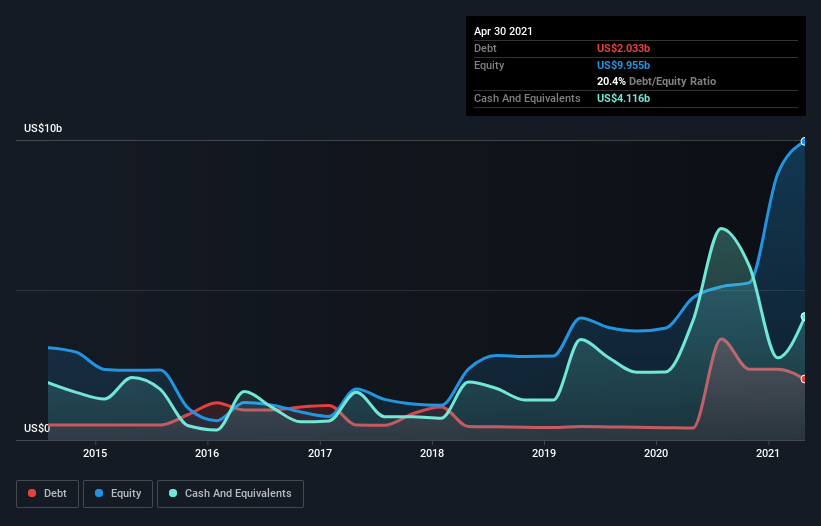Legendary fund manager Li Lu (who Charlie Munger backed) once said, 'The biggest investment risk is not the volatility of prices, but whether you will suffer a permanent loss of capital.' So it might be obvious that you need to consider debt, when you think about how risky any given stock is, because too much debt can sink a company. We can see that Intuit Inc. (NASDAQ:INTU) does use debt in its business. But should shareholders be worried about its use of debt?
When Is Debt A Problem?
Debt is a tool to help businesses grow, but if a business is incapable of paying off its lenders, then it exists at their mercy. In the worst case scenario, a company can go bankrupt if it cannot pay its creditors. However, a more usual (but still expensive) situation is where a company must dilute shareholders at a cheap share price simply to get debt under control. Of course, the upside of debt is that it often represents cheap capital, especially when it replaces dilution in a company with the ability to reinvest at high rates of return. When we think about a company's use of debt, we first look at cash and debt together.
Check out our latest analysis for Intuit
How Much Debt Does Intuit Carry?
You can click the graphic below for the historical numbers, but it shows that as of April 2021 Intuit had US$2.03b of debt, an increase on US$398.0m, over one year. However, it does have US$4.12b in cash offsetting this, leading to net cash of US$2.08b.

How Strong Is Intuit's Balance Sheet?
We can see from the most recent balance sheet that Intuit had liabilities of US$2.71b falling due within a year, and liabilities of US$3.09b due beyond that. On the other hand, it had cash of US$4.12b and US$651.0m worth of receivables due within a year. So its liabilities outweigh the sum of its cash and (near-term) receivables by US$1.04b.
This state of affairs indicates that Intuit's balance sheet looks quite solid, as its total liabilities are just about equal to its liquid assets. So while it's hard to imagine that the US$138.3b company is struggling for cash, we still think it's worth monitoring its balance sheet. Despite its noteworthy liabilities, Intuit boasts net cash, so it's fair to say it does not have a heavy debt load!
On top of that, Intuit grew its EBIT by 68% over the last twelve months, and that growth will make it easier to handle its debt. The balance sheet is clearly the area to focus on when you are analysing debt. But ultimately the future profitability of the business will decide if Intuit can strengthen its balance sheet over time. So if you want to see what the professionals think, you might find this free report on analyst profit forecasts to be interesting.
Finally, a business needs free cash flow to pay off debt; accounting profits just don't cut it. Intuit may have net cash on the balance sheet, but it is still interesting to look at how well the business converts its earnings before interest and tax (EBIT) to free cash flow, because that will influence both its need for, and its capacity to manage debt. Over the last three years, Intuit actually produced more free cash flow than EBIT. That sort of strong cash generation warms our hearts like a puppy in a bumblebee suit.
Summing up
While it is always sensible to look at a company's total liabilities, it is very reassuring that Intuit has US$2.08b in net cash. And it impressed us with free cash flow of US$2.9b, being 117% of its EBIT. So is Intuit's debt a risk? It doesn't seem so to us. When analysing debt levels, the balance sheet is the obvious place to start. However, not all investment risk resides within the balance sheet - far from it. For example, we've discovered 3 warning signs for Intuit that you should be aware of before investing here.
If you're interested in investing in businesses that can grow profits without the burden of debt, then check out this free list of growing businesses that have net cash on the balance sheet.
When trading Intuit or any other investment, use the platform considered by many to be the Professional's Gateway to the Worlds Market, Interactive Brokers. You get the lowest-cost* trading on stocks, options, futures, forex, bonds and funds worldwide from a single integrated account. Promoted
New: AI Stock Screener & Alerts
Our new AI Stock Screener scans the market every day to uncover opportunities.
• Dividend Powerhouses (3%+ Yield)
• Undervalued Small Caps with Insider Buying
• High growth Tech and AI Companies
Or build your own from over 50 metrics.
This article by Simply Wall St is general in nature. It does not constitute a recommendation to buy or sell any stock, and does not take account of your objectives, or your financial situation. We aim to bring you long-term focused analysis driven by fundamental data. Note that our analysis may not factor in the latest price-sensitive company announcements or qualitative material. Simply Wall St has no position in any stocks mentioned.
*Interactive Brokers Rated Lowest Cost Broker by StockBrokers.com Annual Online Review 2020
Have feedback on this article? Concerned about the content? Get in touch with us directly. Alternatively, email editorial-team (at) simplywallst.com.
About NasdaqGS:INTU
Intuit
Provides financial management, payments and capital, compliance, and marketing products and services in the United States.
Outstanding track record with flawless balance sheet.
Similar Companies
Market Insights
Community Narratives



